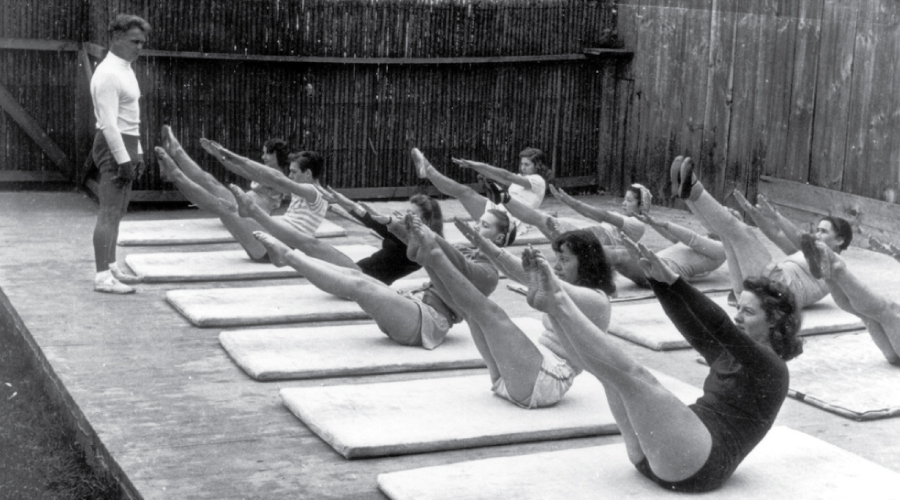Recurring postural issues and faulty movements can be prevented through functional training. Joseph Pilates, who created the Pilates method, wrote the following in his book “Return to Life Through Contrology”:
“Civilization Impairs Physical Fitness. Physical fitness is the first requisite of happiness. It is the attainment and maintenance of a uniformly developed body as well as a sound mind, fully capable of naturally, easily and satisfactorily performing our many and varied daily tasks with spontaneous zest and pleasure”.
It is often said that Joseph Pilates was 50 years ahead of his time. Today, our lifestyles and postures are affecting our health. Physiotherapists report that the majority of clients they see have complaints as a result of postural dysfunction and or faulty movement patterns. Long periods of time spent sitting in front of a computer, combined with age-related changes in the musculoskeletal system, mean that pain and postural problems are often inevitable. Postural dysfunctions, reduced gait cycle, and loss of balance control and stability are among the many well-documented consequences of musculoskeletal changes that occur over a person’s lifespan.
Recurrent musculoskeletal pain has a significant impact on health care costs, employee productivity, and quality of life. Improving aberrant movement patterns is essential for maintaining a healthy lifestyle. Everyone has the capability of improving the way they move on a day-to-day basis. Uncontrolled movement can be identified by observation, and corrective retraining of this uncontrolled movement may reduce the recurrence of injury. Prior to treatment, the assessment and analysis of movement patterns are essential for identifying risks. Through understanding these faults in movements they can be addressed and muscles that once were firing incorrectly can learn to work well and be strengthened.
Spinal Stability
Since Joseph Pilates’ death in 1967, his ideas about spinal stability have been examined from more of a scientific approach, with many benefits identified. Over the last two decades, spinal stability research has been a focus of the physiotherapy world, and from this research, physiotherapists know that the most effective way to manage spinal instability is with specific exercise programmes that are designed and supervised by a physiotherapist. Improving muscular activity of the core is now accepted as being more appropriate than past training regimes that look at improving performance through strengthening periphery muscles. Motor re-learning strategies that look more at muscle and movement efficiency are replacing strength and power regimes.
“The success of the Pilates system in managing pain, inhibiting pathology, and training coordinated movements, is that it gives the physiotherapist a tool to be able to address the motor control specifics of dysfunction and, more importantly, problem solve the reason or pathology behind the situation”. Joseph Pilates
The value of Joseph Pilates’ work to a physiotherapist now extends beyond rehabilitation exercises, which act as an adjunct to treatment, to be a very effective treatment tool in itself that can be employed as an alternative to “hands-on” management. This assists the clinician in confidently progressing to a more pathology-specific exercise regime, rather than a programme of generic exercises. In their book, “Kinetic Control – the management of uncontrolled movement”, Comerford and Mottram suggest that exercise therapies such as Pilates are useful therapies for the management of movement dysfunction.
These therapies are great for movement dysfunction because they create multi-joint movements, incorporating:
- slow movement
- low force movements
- large range movements
- coordination and control of rotation
- a smooth transition of concentric–eccentric movement
- awareness of gravity
- the concept of a ‘core’
- coordinated breathing
- awareness of posture
- an intermittent static hold of position
- control of the centre of mass of one body segment with respect to adjacent segments
- proximal control for distal movement and
- positive mental attitude
The Body Refinery provides its clients with the ability to move without restrictions by offering movement assessment and exercise therapies such as Pilates, which improve movement, wellness, and quality of life. Physiotherapists at The Body Refinery utilise the latest evidence in movement to promote healthy movement patterns and improve posture.
_ _ _
Join The Body Refinery’s Pilates classes and focus on your health and mind-body connection. Create your profile or book a class now!
Follow us on Facebook, Instagram and Twitter for a daily dose of Pilates and Wellbeing.


